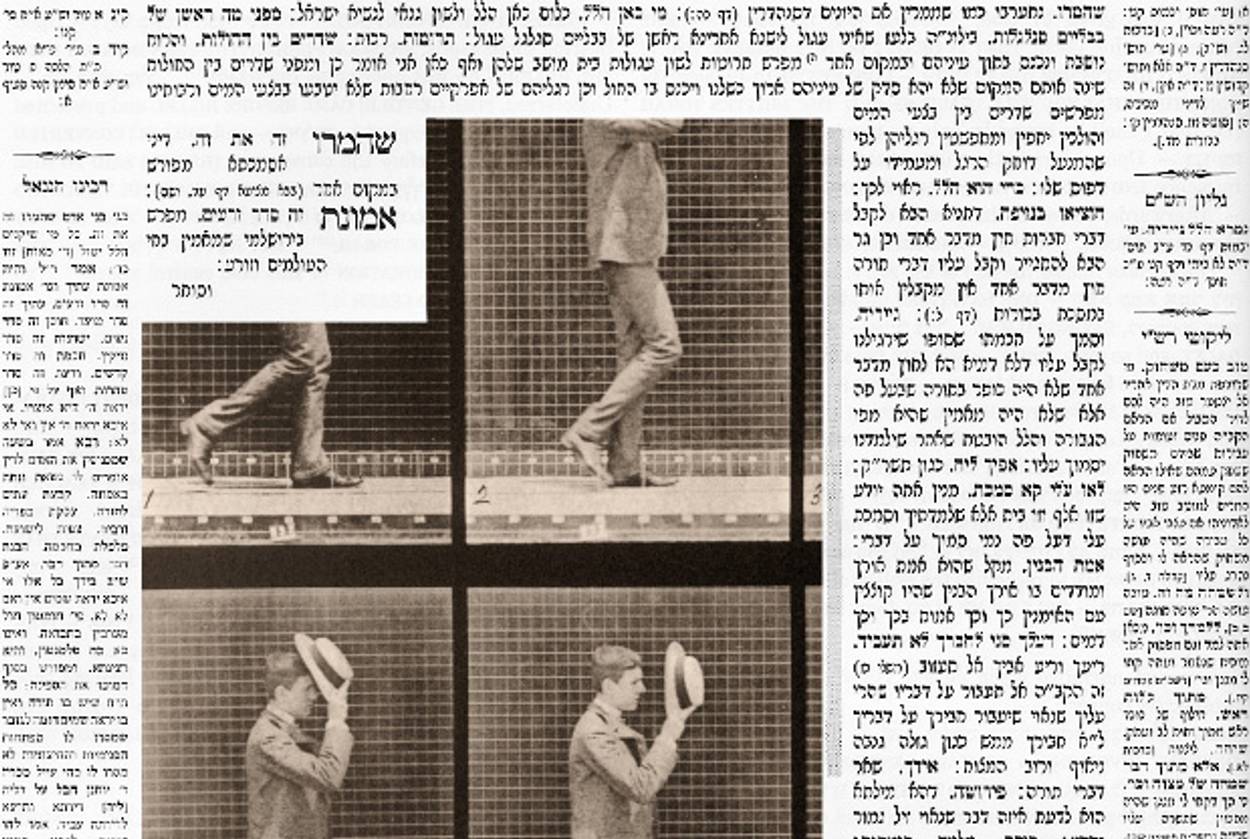Standing on One Foot
The origin of a famous anecdote shines light on the compromises of Conservative and Reform Judaism




Literary critic Adam Kirsch is reading a page of Talmud a day, along with Jews around the world.
While reading Daf Yomi this week, I came with a shock of recognition upon one of the most famous anecdotes in Jewish history—indeed, one of the few Talmudic passages that most Jews are likely to recognize, though they might not know (as I didn’t, until now) that its source is Shabbat 31a. This is the story of how a Gentile came to the great pair of rabbis, Hillel and Shammai, and promised that he would convert to Judaism if they would teach him the Torah while he stood on one foot.
The sages’ answers are given in the Talmud as testimony to their very different personalities. The stern Shammai impatiently “pushed [the Gentile] away with the ruler he was holding in his hand.” To him, the idea that you could learn the Torah—which would have to include the Oral Torah, the whole Mishnah—while standing on one leg was so preposterous that the Gentile’s question could only be mockery. The humble Hillel, on the other hand, returned the answer that has become proverbial: “That which is hateful to you, do not do to your fellow; this is the entire Torah, all the rest is an elaboration. Now go and learn it.”
It’s no wonder that Jews in the 21st century are so fond of Hillel’s maxim. Many Jews who are not Orthodox long for a connection with Jewish tradition that does not take the form of obeying a plethora of seemingly arbitrary, highly constraining laws. Hillel seems to hold out the promise that we can be good Jews, faithful to the “entire Torah,” by practicing ethics rather than observing law. Being a good Jew, he seems to say, is the same as being a good person.
It is only when you encounter Hillel’s saying in the context of the Talmud that it becomes clear just how nonsensical our modern interpretation of his words would have seemed to him. Yes, the ethical spirit of the Torah is supreme: For Hillel and for many other rabbis quoted in the Talmud, observance of the laws is nothing without genuine piety and goodness. And yes, Hillel puts a greater emphasis on the spirit of the laws than Shammai, with the result that he was able to convert the Gentile who Shammai would have turned away: “The sternness of Shammai sought to banish us from the world,” says a group of proselytes later in the chapter, “but the humble manner of Hillel brought us under the wings of the divine presence.”
But it is crucial, if we are to be true to the moral of the story, not to omit the last words Hillel addresses to the Gentile: “Now go and learn it.” To learn Torah, to study the Mishnah and the Talmud, is for the rabbis the natural result and necessary expression of piety. We have already seen many examples of how the rabbis place Torah study at the center of Jewish life, ranking it even above prayer, considering it the purpose of human existence. And we have seen their contempt for the “am haaretz,” the unlearned, unobservant Jew of their time.
As if to drive the point home, the story about Hillel is immediately followed by an explication of a verse from the book of Isaiah, which reads: “The stability of your time and the strength of salvation is wisdom and knowledge; the fear of God is His storehouse.” In this line, Reish Lakish taught, each word corresponds to one of the six tractates of the Mishnah: “stability refers to the Order of Zeraim, your time refers to the Order of Moed,” and so on. For the rabbis, the laws are the very substance of God’s attributes, and study of the laws is the best way to approach the divine. When they go on to explicate the phrase about “the fear of God,” they place reverence higher than Torah scholarship: “Any person who has acquired for himself Torah, but has not acquired the fear of Heaven, is comparable to a treasurer to whom the keys to the inner chambers have been handed, whereas the keys to the outer changers were not handed to him.” Fear of God, in other words, is the prerequisite to Torah study; but as always, Torah study is the “inner chamber,” the place where we are meant to dwell.
To be faithful to the spirit of the Talmud without being faithful to the laws of the Talmud is, in fact, not to be faithful to the spirit of the Talmud. (These passages of ethical sublimity are followed, without a transition, by a discussion of the technical legal rules about when it is acceptable to extinguish a candle on Shabbat: There is no break between theory and practice.) But then, Hillel’s maxim about doing unto others is not the last word in the Talmud’s ethics.
In fact, this week’s reading also included one of the most troubling passages I have read so far. This came in Shabbat 31b and the following pages, when the rabbis announce that “For three transgressions women die in childbirth: Because they are not careful regarding the laws of niddah (ritual and sexual purity), challah (the tithing of dough to a priest), and the kindling of the Sabbath candle.” Why should failing to light a Sabbath candle deserve the death penalty? Because “The soul that I have placed within you,” God might reply, “is called a candle” (in the Book of Proverbs: “The candle of God is man’s soul”). And why, in particular, should it be death in childbirth that God inflicts? Because, says Rava, “When the ox has fallen, sharpen the knife”: in other words, childbirth is a time when a woman is already vulnerable to death, just as a fallen ox is vulnerable to slaughter.
The idea that God kills women in childbirth because they have been lax about lighting candles and tithing dough is, for me as for most modern people, utterly unacceptable. I, for one, find it simply impossible to believe in such a God. Likewise, I feel revulsion at the attitude toward women expressed in the ensuing discussion, where we are told that God punishes men who sin by killing their wives and children—as though the wife was not a moral agent with her own deserts, but a possession of which a man can be justly deprived.
For me, one of the crucial experiences of reading Daf Yomi has been thinking not just about the text, but about my relationship to the text. I have had to realize quite clearly just how distant my own thinking about God, law, and obligation is from the rabbis’. In a way, reading the Talmud has given me a new respect for what can often seem like the tepid compromises of Reform and Conservative Judaism: There are, I realize, principled reasons why many of today’s Jews seek a new basis for Jewish belief, reasons other than laziness before the Talmud and its laws.
At the same time, I have also tried to avoid the kind of indignation that would dismiss the rabbis’ way of thinking as simply outmoded and reassure me as to my own modern superiority. I always have in mind that I am reading a religious work through secular eyes, that I am reading a work of instruction but not as a student. These contradictions haven’t made me shy away from the Talmud, but they have encouraged me to treat it with respect—even or especially when I recognize its distance from me, or mine from it.
***
Like this article? Sign up for our Daily Digest to get Tablet Magazine’s new content in your inbox each morning.
Adam Kirsch is a poet and literary critic, whose books include The People and the Books: 18 Classics of Jewish Literature.
Adam Kirsch is a poet and literary critic, whose books include The People and the Books: 18 Classics of Jewish Literature.